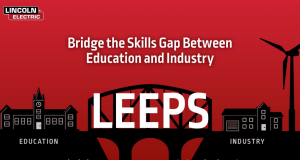 There is a welding skills gap, and that could actually mean a couple different things: It could mean there simply are not enough skilled welders to fill the welding careers available, or it could mean there is a disconnect between the skills employers are looking for and the skills applicants actually have. Either way, this gap existing is a real problem in the welding industry today—for both employers and job-seeking welders.
There is a welding skills gap, and that could actually mean a couple different things: It could mean there simply are not enough skilled welders to fill the welding careers available, or it could mean there is a disconnect between the skills employers are looking for and the skills applicants actually have. Either way, this gap existing is a real problem in the welding industry today—for both employers and job-seeking welders.
If the problem is that trained welders do not have the specific skills employers are looking for, then the solution is to examine welding education and find a way to bridge the gap. Educational institutions communicate with the welding industry to understand which skills their students actually need for today’s jobs. Because the industry is constantly changing, the needed skills are constantly changing—which means that this communication between education and industry must be ongoing.
Because Lincoln Electric is heavily involved in both industry and welding education, communication is constantly maintained between the two to improve curriculum and training as the industry evolves. From this, the Lincoln Electric Education Partner Schools (LEEPS) welding program was created.
The LEEPS welding certification program is a partnership with the National Coalition of Certification Centers (NC3), which provides curriculum and learning management resources for students and welders to earn standards-based certifications. These certifications are portable and stackable, which means welders can build their own skill base for specific job requirements by combining the skills and certifications they need for immediate employability.
The LEEPS program creates standardization with the train-the-trainer program. All instructors who teach and certify welding students through a partner school have been through the same training, taken the same tests, and used the same curriculum materials. That means employers can see these certifications and know anyone who earned them was taught the same content in the same way and has passed the same weld tests with the same grading rubric. This kind of consistency helps welders to have documented, proven competencies to show employers; and employers know they can expect this consistency from an institution with a standardized process.
Because this program offers a way to integrate certifications into an existing educational institution, it doesn’t limit students or employers to one area. With a traditional welding school, students all train at a single location and are likely to seek jobs in the same general area. With a program like LEEPS, the same quality welding education is available all over the country, so it’s more accessible to students and employers alike. This means employers can find job applicants in their area with the same qualifications as the job seekers in many states across the U.S. Employers can even set up their own internal training with LEEPS to put their welders on the fast track to certification in the specific areas that are needed in their workplace.
There’s a skills gap in the welding industry, but we can set up our welding education programs to help fix it. With standardized, configurable training, today’s welders can complete valuable certifications in a way that’s both convenient and relevant to the available jobs. By joining industry and education in communication, curriculum can be tailored to meet the needs of both welders and employers in today’s job market.
For more information about our education programs, please visit the Education Solutions section of our website.
Sarah Evans, Education Sales and Marketing Manager, Lincoln Electric
Tags: business and industry partnerships, CTE Fall Meeting, Industry Certifications, Sponsor, Workforce Training

